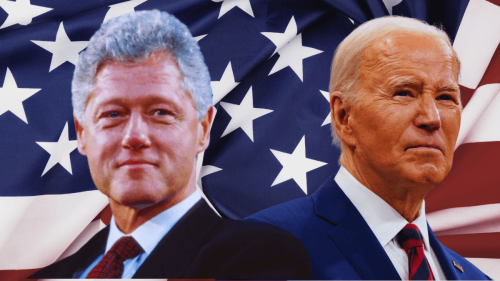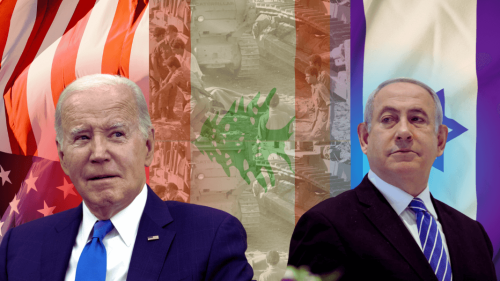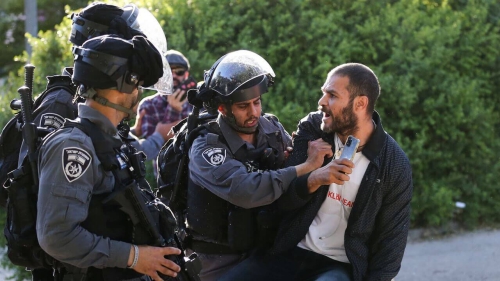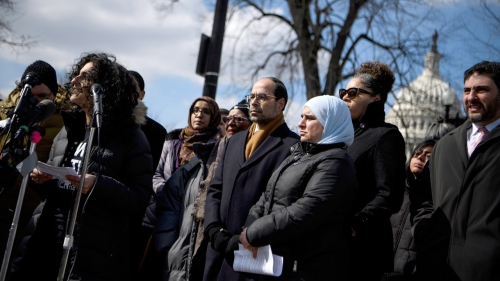ARAB AMERICAN ATTITUDES TODAY
Arab Americans, across the spectrum, retain strong pride in their ethnicity but have become increasingly concerned about the policies of the Bush presidency. These are some of the findings of a recent poll commissioned by the Arab American Institute (AAI) and conducted at the end of May 2002 by Zogby International (ZI), a prominent New York-based polling company. The poll surveyed 505 randomly selected Arab Americans nationwide. It has a margin of error of 4.5%.
According to the May 2002 AAI/ZI poll only 43% of Arab Americans give the Presidency of George W. Bush an excellent or good performance rating, while 55% rate his presidency as fair or poor. This is a strikingly low rating, especially at a time when most polls show that in the country as a whole, the President has a 70-25 net positive job performance rating.
This also marks a turnabout from just eight months ago when in an October 2001 AAI/ZI poll, Arab Americans were giving the President an 83% positive performance rating, against a mere 15% who rated his performance negatively. It should also be recalled that Bush won the plurality of Arab American votes in the 2000 elections. According to a Zogby International post-election study, Bush won 45.5% of the Arab American vote, while Al Gore won 38%. Green Party candidate Ralph Nader won a large 13.5% of the Arab American vote.
The May 2002 AAI/ZI poll also shows that 67% of Arab Americans still approve of President Bush's handling of the September 11 terrorist attacks, while only 31% disapprove. This is down from 88% who approved of his handling of the attack in the October 2001 poll.
The most dramatic negative ratings given to President Bush's performance came in response to questions regarding his Middle East policy. Only 23% of the Arab Americans surveyed in May 2002 approved of his Administration's policy toward Arab countries, while 56% disapprove of the U.S.' Arab policy. In contrast, in October 2001, a slight majority of Arab Americans actually approved of the Administration's policy toward Arab countries. The ratio was 40% approve to 37% disapprove. When asked in May 2002 to evaluate the President's handling of the Palestinian-Israeli conflict, Arab Americans disapprove by a ratio of 3 to 1 (24% approve to 73% disapprove).
What is especially important to note here is that these attitudes are consistent in all of the sub-groups that comprise the Arab American community. While somewhat stronger among some sub-groups, no group gives Administration policy a positive rating. For example, while among Arab Americans born in the U.S., the ratio of those who approve/disapprove of the Administration's policy toward the Palestinian-Israeli conflict is 28% approve to 70% disapprove--among Arab American immigrants the percentages are 13% approve to 81% disapprove.
Another area where Arab Americans appear to have concerns with the policies of the Bush Administration is closer to home. Seventy-eight percent of Arab Americans feel that there has been more profiling of Arab Americans since September 11. While the community is now almost evenly divided as to whether or not this selective treatment is justified, about two-third of Arab Americans express concern that this situation will result in the long term in greater discrimination against Arab Americans.
In the month after September 11, Arab Americans were reassured that President George W. Bush was defending and protecting their civil rights. This does not appear to be the case today.
When asked in May if they were reassured by President Bush's comments and conduct toward Arab Americans since the September 11 attacks, fifty-four percent of Arab Americans said they have been reassured, while 35% said they were not reassured. This ratio is down sharply from the results of the October 2001 poll when 90% of the Arab Americans surveyed said they had been reassured by the President's response to Arab Americans.
These results make clear that Arab Americans have concerns with the Administration's foreign and domestic policies. In an effort to measure what effect a change in policy would have on Arab American attitudes, we asked a number of prescriptive questions in the May 2002 poll. For example, when asked whether they would be more or less favorable toward the President if he were to "exert pressure toward the creation of a Palestinian state", seventy percent of those Arab Americans surveyed said they would be more favorable. Only 2% said they would be less favorable toward the Administration. Of lesser concern, but still an issue for many Arab Americans, is the continuing matter of Iraqi sanctions. A plurality of Arab Americans (44%) said they would be more favorable toward the President if he were to end the economic sanctions against Iraq. Twenty-two percent, however, said they would be less favorably inclined toward the Administration.
In another set of findings from the May 2002 poll, we learned that despite the Arab American community's anger at the terrorists who attacked the U.S. and the resultant discrimination experienced in the aftermath of September 11, Arab Americans, as a whole, continued to maintain strong pride in their ethnicity and heritage.
Overall, eighty-nine percent of Arab Americans professed to be either extremely or very proud of their ethnicity. This is virtually the same as the percentage (90%) who claimed strong attachment in a January 2000 poll and is up slightly from the lower 87% recorded in the October 2001 poll.
The most recent May 2002 showed that while some Arab Americans may have grown concerned about publicly acknowledging their ethnicity since September 11, most reacted to the terrorist attacks in a different way.
On the one hand, over 80% of Arab Americans reported that they responded to the terrorist attacks, as did most of their fellow Americans, by displaying American flags, contributing to victims' funds, or donating blood. On the other hand, most Arab Americans wanted to make it clear that they were not going to deny their ethnicity during this crisis. While 73% reported that they felt the same pride in their ethnic heritage during the past several months, fifteen percent actually reported feeling more pride. Only 8% of Arab Americans indicated that they were less proud of their ethnicity since September 11.
It is also interesting to observe that 42% of those surveyed in the May 2002 poll said that they were engaging in discussions about events in the Middle East more often after September 11, while another 43% were doing so to the same degree as before. Only 14% indicated that they were less inclined to engage in public discussions now.
What emerges from this comparison of polls of Arab American attitudes and behavior is that the community has reacted quite strongly to the severe crisis of the past nine months. They faced discrimination (20% reported experiencing discrimination since September 11); they have been afraid not only of a backlash, but of its long term effects; they were angry and embarrassed by the actions of the terrorists (two-thirds reported feeling these emotions); they proudly displayed their American patriotism, while at the same time maintaining their pride in their Arab heritage; they maintained their deep concerns about the conflicts in the Middle East and about U.S. policy in that region; they continued to publicly express their views about these concerns; and they have increasingly grown concerned with the policies of the Bush Administration in addressing these critical Middle East issues.
What is especially noteworthy is the degree to which consensus exists among the many diverse component groups that comprise the Arab American community. Despite being tried and tested, the community has, it appears, emerged strong and vibrant, proud and ready to play its part in the U.S. policy debate.
For comments or information, contact [email protected] or http://www.aaiusa.org.
Dr. James J. Zogby is the President of Arab American Institute.

















